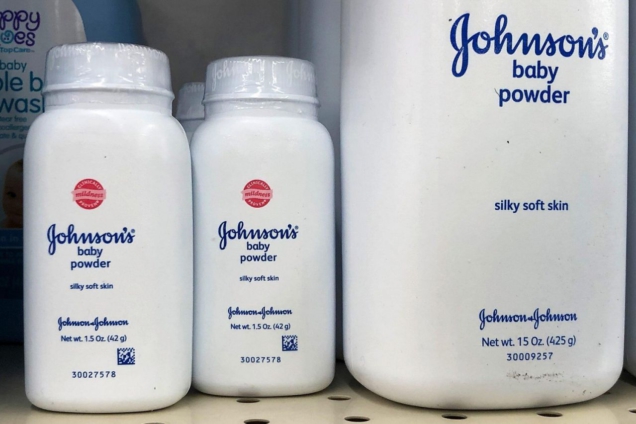Healthcare giant Johnson & Johnson says it will continue to sell its talc-based Johnson's Baby Powder in the UK and the rest of the world, despite stopping sales in the US and Canada.
It said North American sales had shrunk partly because of a "constant barrage" of advertising by lawyers seeking clients to claim against the company.
J&J has been at the centre of claims for years that its talc causes cancer.
It has always strenuously defended the product's safety.
Johnson & Johnson has been ordered to pay out billions of dollars in compensation, but has so far always successfully appealed against these verdicts.
Almost 20,000 people in the US have so far lodged claims against the company.
Talc is mined from the earth and is found in seams close to that of asbestos, a material known to cause cancer.
The company said in a statement: "Johnson & Johnson remains steadfastly confident in the safety of talc-based Johnson's Baby Powder."
It said "decades" of study by medical and legal experts around the world supported its view, and all verdicts against the company that had gone against it had been overturned on appeal.
Dampened demand
It will continue to sell its talc-based products in the US and Canada until stocks have sold out.
It also sells a cornstarch-based powder which it will continue to sell in North America.
It said both types of Johnson's baby powder, talc-based and cornstarch-based, will continue to be sold in other markets around the world where there is "significantly higher" consumer demand for the product.
The firm said changes in consumer behaviour had also dampened demand for the powder.
The firm added that the move was also part of a reassessment of its consumer products prompted by the coronavirus pandemic.
It said in October that its testing had found no asbestos in its baby powder after tests conducted by the US Food and Drug Administration discovered trace amounts.
The firm is appealing against a 2018 order to pay $4.7bn (£3.6bn) in damages to 22 women who alleged that its talc products caused them to develop ovarian cancer.
Latest Stories
-
Syria’s minorities seek security as country charts new future
2 minutes -
Prof. Nana Aba Appiah Amfo re-appointed as Vice-Chancellor of the University of Ghana
9 minutes -
German police probe market attack security and warnings
10 minutes -
Grief and anger in Magdeburg after Christmas market attack
11 minutes -
Baltasar Coin becomes first Ghanaian meme coin to hit DEX Screener at $100K market cap
1 hour -
EC blames re-collation of disputed results on widespread lawlessness by party supporters
1 hour -
Top 20 Ghanaian songs released in 2024
2 hours -
Beating Messi’s Inter Miami to MLS Cup feels amazing – Joseph Paintsil
2 hours -
NDC administration will reverse all ‘last-minute’ gov’t employee promotions – Asiedu Nketiah
2 hours -
Kudus sights ‘authority and kingship’ for elephant stool celebration
2 hours -
We’ll embrace cutting-edge technologies to address emerging healthcare needs – Prof. Antwi-Kusi
3 hours -
Nana Aba Anamoah, Cwesi Oteng special guests for Philip Nai and Friends’ charity event
3 hours -
Environmental protection officers receive training on how to tackle climate change
3 hours -
CLOGSAG vows to resist partisan appointments in Civil, Local Government Service
4 hours -
Peasant Farmers Association welcomes Mahama’s move to rename Agric Ministry
4 hours

